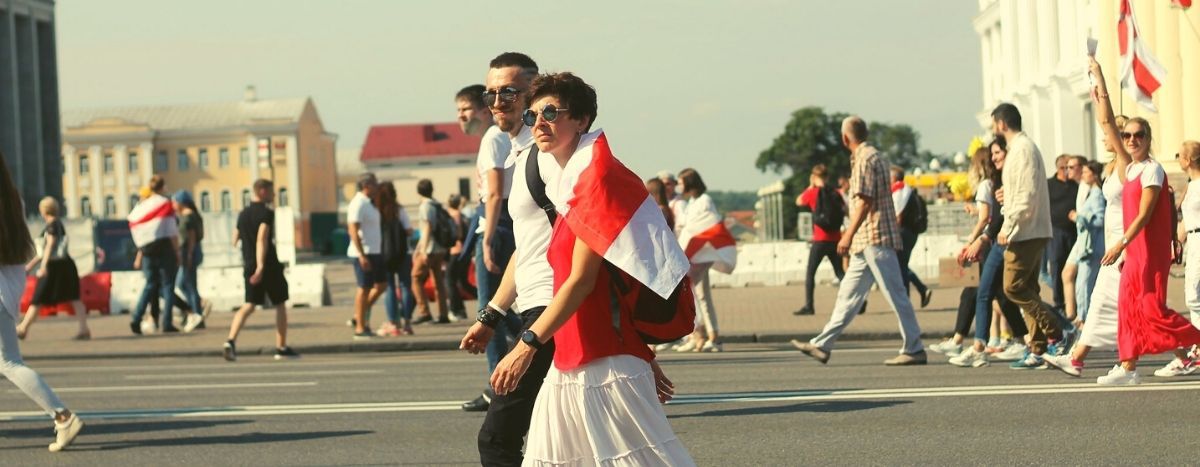
Exiled in Lithuania: voices of the Belarusian opposition
Published on
Translation by:
 Magali SETTE
Magali SETTE
Since the re-election of President Alexander Lukashenko last August, Belarus has been plunged into a revolution that seems almost won and, at the same time, far from over. The protesters are numerous and determined. Yet their opponent, a former kolkhoz director who has held absolute power for nearly 26 years, refuses to budge. Hundreds of opponents of the regime have been forced to leave their country to seek asylum in Poland, Ukraine and Lithuania. Now these nations, which all border Belarus, are enabling democrats to regroup in safety.
Maria Moroz is a shy woman. She describes herself as an ordinary citizen who has been given a political role that she was unprepared for. "I believe this is the situation of all Belarusians, I am no exception," she adds. Maria is the chief strategist to Svetlana Tikhanovskaïa, a leading figure in the democratic movement. Since the presidential elections in August, which the opposition claims were marred by electoral fraud, both have moved to Vilnius, the Lithuanian capital.
"On the eve of the elections, on 8 August, I found myself in prison," says Maria, who, aside from her role in Tikhanovskaïa's campaign, is a mother of two. "On the 10th I had to go to court. Then I was sent back to Okrestina prison. After spending a few hours in my cell, I was introduced to a man in a suit. Then there was a period that I can't speak about. This is a request from Svetlana." After these events, the two women left by car, immediately, with Maria's children. Her husband was already in Lithuania. "I was afraid we'd never get across the border,” she says, referring to her concern that the car might be booby-trapped.
Ms. Moroz first joined forces with Svetlana Tikhanovskaïa when the opposition leader was seeking to collect the necessary 100,000 signatures from citizens to render her campaign legitimate according to the country's electoral laws. "Svetlana was carrying those pieces of paper around herself. She came to my house and she seemed so alone. At that moment I understood that I could help her by organising a team of volunteers. That’s when I realised I had to do something... " Maria does not see a future for herself in politics. She is more interested in pursuing citizens' initiatives, for the common good.
The whole country, standing together
For Ms. Moroz, the revolutionary movement is a reflection of the evolution of Belarusian consciousness which she says has been made possible by the internet and by foreign travel. "Today we can communicate with other people and see what is happening elsewhere." Lukashenko's failure to manage the Covid-19 health crisis has discredited the Belarusian leader in the eyes of his people. "In the spring, the president said that the coronavirus was just a psychosis and that it did not exist in Belarus." By organising spontaneous lockdowns, at a community level, "the Belarusians understood that they had succeeded in fighting the virus on their own." According to Maria, people realised that they did not want the kind of president that had done so little to protect his people.
Whether in the country or abroad, Belarusians now insist on referring to Lukashenko as the 'Mad Grandpa'. Maria says she communicates with a team of volunteers in Minsk every day to find out how the refugees in Lithuania can help from their position on the outside. Even though there are no barriers to their communication, "the people who are still in Belarus don't necessarily recognise what work we're doing here," she laments.
In reality, Svetlana Tikhanovskaïa's exiled campaign is now attempting to open a foundation that can help civil society in Belarus. "It is an independent foundation which was set up by Svetlana and Sergei Tikanovsky [a prominent blogger and dissident]." Many of those who are still in Belarus and are continuing to fight have been detained. As a result, there are a lot of families now without a father and who are now trying to leave but need visas. "We decided to set up this fund in order to help them,” she says.
Other exiles, including those that supported different candidates in the elections, are backing the venture. Katia Kanapliova, a coordinator of volunteers at the headquarters of Mr. Babariko, the alternative presidential candidate, is one such figure. Babariko, the ex-president of the Russian bank Belgazprombank, was arrested in June when the Belarusian government discovered he had gathered the requisite signatures to take part in the election.
Before entering politics, Katia, who is 25 years old, worked as an interpreter, translator and part-time French teacher. She arrived in Vilnius three weeks ago. Although no official statistics are yet available, Katia estimates that “a few hundred people have fled [to Lithuania]." Hundreds more Belarusians, especially those living in the western region of Grodno have also emigrated to Poland. As Katia explains: "if you have Polish parents or grandparents, you're lucky as you can get a certificate to stay there."
All for one and one for all
The two rival political campaigns are now uniting against the authoritarian regime. "We are also developing some projects with Tikhanovskaïa's team. Like the work on the International Congress of Belarusians [which took place on Saturday 31 October]." The Congress serves as a forum for discussing strategies to overcome the political crisis in Belarus. "Before these elections, there was no union of Belarusians. Now the country has united against the regime. The diasporas, that is to say the Belarusians who are abroad, are also united," says Katia.
"We can get invited to talk and end up in jail"
At a dinner hosted by Katia, we meet two men who left the country on re-election day. The first, Ilya Begun, was involved in hacking a government website. "I left to escape potential harm. Challenging political censorship doesn't promise a good future in Belarus. We can get invited to talk and end up in jail. You can't tell, it's like Russian roulette," he explains.
Once in Lithuania, political refugees from Belarus can find one another thanks to an association called 'Dapamoga' which is based in Vilnius. Its members are very active on a Facebook group and promptly answer questions from those that join up. Most of the questions are about accommodation, contact details or how best to cross the Lithuanian-Belarusian border. The Lithuanian government itself has even provided members of the opposition with physical offices where the various teams can work together.

The second man introduces himself more straightforwardly: "My name is Slava, I am from Minsk and I love Belarus." He also participated in collecting signatures for Babariko. "It was a record in Belarusian history. We got about 400,000 signatures. More than 450,000, I think."
Slava recounts the difficulty of campaigning for an opposition candidate in Belarus. "It was actually a huge joke," he says. "The government doesn't want the opposition to be able to hold meetings. In one city, we were able to hold a single five-minute debate because the police there did not want Loukachenko to win." Despite this fact, however, the same police urged them to leave quickly for fear of reprisals.
Slava also talks about the online shutdown which occurred following the election results, explaining that the government has total control over the Internet and can cut it off in a snap. After the election, there were several such cuts which varied in length. According to Slava, the leaders want to prevent people from joining the demonstrators. "They think we’re going to make an appointment instantly when we can very well just plan to meet the day after. It's very stupid," he remarks, explaining that the shutdowns do not discourage people from taking to streets and that, if anything, they only serve to remind the people of the President’s control over almost every institution in the country. Clearly, this tactic is not going to keep the opposition at home.
"I used to be part of the largest community in Belarus, the apoliticals"
According to Slava, the people of Belarus want stability. That is why most of them are afraid to go and protest. They fear losing that balance. To illustrate this concept, he tells us about his parents: "Whenever I go to a restaurant [my parents] ask me why I need to do it. They tell me to keep my money and save it to buy an apartment or build a house." This is a legacy of the USSR, he continues, to put stability before freedom. For Slava, though, stability means something quite different: "it's when you can have what you want without having to choose between a restaurant and a house."
Belarusian culture has undergone a transformation over the past year: "Before this campaign I used to be part of the largest community in Belarus, the apoliticals. We thought we could never win because Lukashenko had won all the previous elections" says Slava. Covid-19, however, has played an important role in shifting perspectives. As people began to die Lukashenko showed his complete disinterest in the issue. According to Slava, as a result, the Belarusians "have already won this war. Mentalities are changing. We have Belarusian solidarity in a way that we have never had." Maria agrees, breaking out into a wry grin: "We no longer represent the opposition. Officially, the opposition is still the minority but we, here, are the majority. Lukashenko is the opposition now."
Cover photo: demonstration in Minsk in August 2020 © Natallia Rak - Flickr
Translated from Vue de Lituanie : les voix de l’opposition biélorusse


